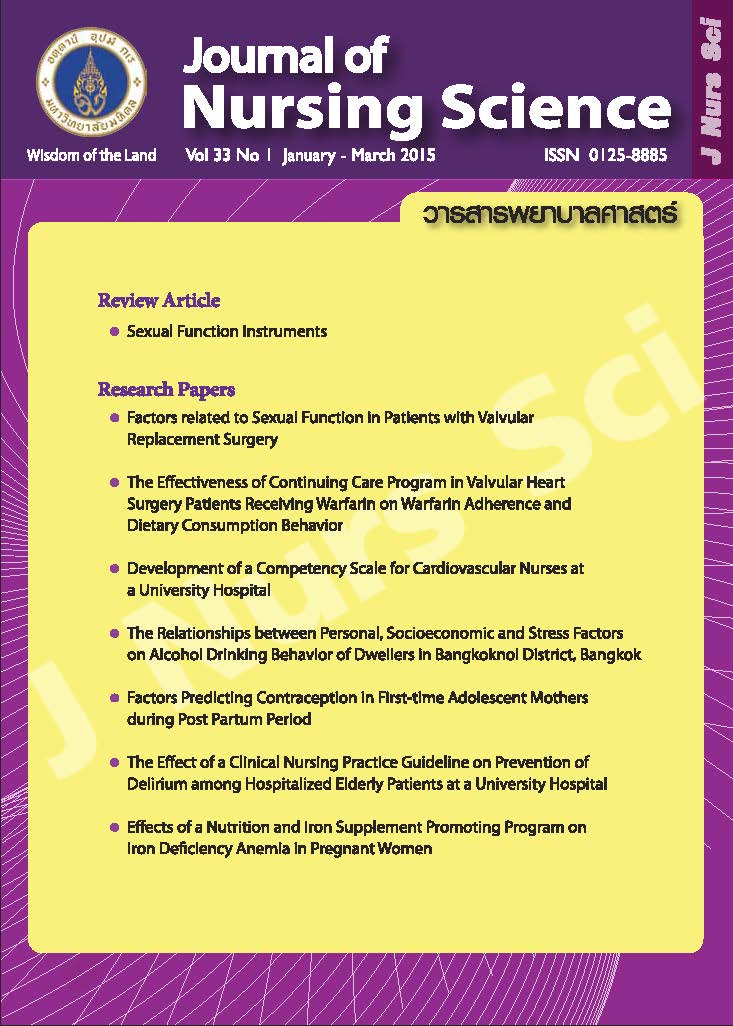The Relationships between Personal, Socioeconomic and Stress Factors on Alcohol Drinking Behavior of Dwellers in Bangkoknoi District, Bangkok
Main Article Content
Abstract
Purpose: To investigate the relationships between personal factors, socioeconomic, and stress factors and alcohol drinking behavior of permanent residence in Bangkok Noi District, Bangkok Metropolitan.
Design: A correlation research design.
Methods: Using Taro Yamane Table, 121,461 populations and 95% of reliability, the samples were 400 permanent residences in Bangkok Noi District, Bangkok Metropolitan. The data was collected by using questionnaires including 1) personal factor, 2) socioeconomic factor, 3) stress factor, and 4) alcohol drinking behavior. The reliability of each questionnaire was .92, .95, .96, .86 and .97 consecutively. Descriptive statistics and logistic regression were used for the data analysis.
Main Findings: Most of the samples were women (51.5%) aged 41-60 years (41%) single/widow/divorce (56%), labor (32.25%), elementary education and lower (67.3%), family income 12,000 baths per month. The mean of stress was equal to 10. The most stress symptoms were giddy or dizzy (10.5%). The regular stress symptom was pain or tense at occipital bone region (3.5%). Men who aged 18 to 40 and 41-60 years and stress level were associated with behavior of drinking alcohol in the present time to be statistically significant at the .05 level and correct in model prediction at 69.8. Men and stress level were associated with behavior of regular drinking alcohol to be statistically significant at the .05 level and correct in model prediction at 75.8. In addition, men (labors and private business) and stress level were related to behavior of drinking healthy risky alcohol to be statistically significant at the .05 level and correct in model prediction at 81.8
Conclusion and recommendations: Gender, age, occupations (labors and private business) income and stress make ones have the behavior of alcohol drinking differently. To control the behavior of alcohol drinking is necessary to consider ones’ different factors to be the way of designing the most effective and suitable intervention with personal group.
ความสัมพันธ์ระหว่างปัจจัยส่วนบุคคล ภาวะเศรษฐกิจและสังคม ความเครียด ต่อพฤติกรรมการดื่มแอลกอฮอล์ของประชาชนในชุมชนเขตบางกอกน้อย กรุงเทพมหานคร
บทคัดย่อ
วัตถุประสงค์: ศึกษาความสัมพันธ์ระหว่างปัจจัยส่วนบุคคล ภาวะเศรษฐกิจและสังคม ความเครียด ต่อพฤติกรรมการดื่มแอลกอฮอล์ของประชาชนในชุมชนเขตบางกอกน้อย กรุงเทพมหานคร
รูปแบบการวิจัย: การวิจัยครั้งนี้เป็นการศึกษาเชิงบรรยายเพื่อศึกษาความสัมพันธ์
วิธีดำเนินการวิจัย: กลุ่มตัวอย่างของการศึกษาครั้งนี้ คือ ประชาชนในชุมชนเขตบางกอกน้อย กรุงเทพมหานคร จำนวน 400 คน ด้วยวิธีเปิดตารางสำเร็จรูปของของ Taro Yamane จากจำนวนประชากร 121,461 คน ที่ระดับความเชื่อมั่นร้อยละ 95 สุ่มเลือกกลุ่มตัวอย่างในชุมชนตามสัดส่วนประชากรโดยการจับฉลาก การรวบรวมข้อมูลด้วยวิธีใช้แบบสอบถาม 5 ชุดมีค่าความเชื่อมั่น .96, .86, .97 วิเคราะห์ข้อมูลโดยการหาความสัมพันธ์ของปัจจัยส่วนบุคคล ภาวะเศรษฐกิจและสังคม ความเครียด ต่อพฤติกรรมการดื่มแอลกอฮอล์ของประชาชน ด้วยสถิติการถดถอยโลจิสติก
ผลการวิจัย: กลุ่มตัวอย่างเป็นเพศหญิง (ร้อยละ 51.5) มีอายุระหว่าง 41-60 ปี (ร้อยละ 41.0) ส่วนใหญ่โสด/หม้าย/หย่าหรือแยกกันอยู่ (ร้อยละ 56.0) มีอาชีพเป็นผู้ใช้แรงงาน (32.25) สำเร็จการศึกษาประถมศึกษาหรือต่ำกว่า (ร้อยละ 67.3) มีรายได้ครอบครัว 12,000 บาท/เดือนและทีความเครียดเฉลี่ยเท่ากับ 10 คะแนน ซึ่งเกิดการเครียดบ่อยๆ เช่น มักมีอาการมึนงงหรือเวียนศีรษะ (ร้อยละ 10.5) ส่วนความเครียดเป็นประจำ คือ อาการปวดหรือเกร็งกล้ามเนื้อบริเวณท้ายทอยหลังหรือไหล่ (ร้อยละ 3.5) เพศชายกลุ่มอายุ (18-40 และ 41-60 ปี) และระดับความเครียดมีความสัมพันธ์ต่อพฤติกรรมการดื่มแอลกอฮอล์ในปัจจุบันอย่างมีนัยสำคัญทางสถิติ .05 และความถูกต้องในการทำนายของโมเดลนั้นมีค่าเท่ากับ 69.8 เพศชายและระดับความเครียดมีความสัมพันธ์ต่อพฤติกรรม การดื่มแอลกอฮอลส์ สม่ำเสมออย่างมีนัยสำคัญทางสถิติ .05 และความถูกต้องของโมเดลการทำนายร้อยละ 75.8 และเพศชาย (ผู้ใช้แรงงาน และ ธุรกิจส่วนตัว) และระดับความเครียดมีความสัมพันธ์ต่อพฤติกรรมการดื่มแอลกอฮอล์ที่มีความเสี่ยงต่อสุขภาพอย่างมีนัยสำคัญทางสถิติ .05 ความถูกต้องของโมเดลในการทำนายสูงถึงร้อยละ 81.8
สรุปและข้อเสนอแนะ: เพศ อายุ อาชีพ (ผู้ใช้แรงงานและธุรกิจส่วนตัว) รายได้และความเครียด ทำให้บุคคลมีพฤติกรรมการดื่มแอลกอฮอล์ที่แตกต่างกัน การจะควบคุมพฤติกรรมการดื่มแอลกอฮอล์ต้องคำนึงถึงปัจจัยดังกล่าวเพื่อเป็นแนวทางในการออกแบบวิธีการช่วยเหลือที่มีประสิทธิภาพและเหมาะสมกับกลุ่มบุคคลมากที่สุด
คำสำคัญ: ปัจจัยส่วนบุคคล ภาวะเศรษฐกิจและสังคม ความเครียด พฤติกรรมการดื่มแอลกอฮอล์
Article Details
Copyright Notice: Nursing Science Journal of Thailand has exclusive rights to publish and distribute the manuscript and all contents therein. Without the journal’s permission, the dissemination of the manuscript in another journal or online, and the reproduction of the manuscript for non-educational purpose are prohibited.

Disclaimer: The opinion expressed and figures provided in this journal, NSJT, are the sole responsibility of the authors. The editorial board bears no responsibility in this regard.


